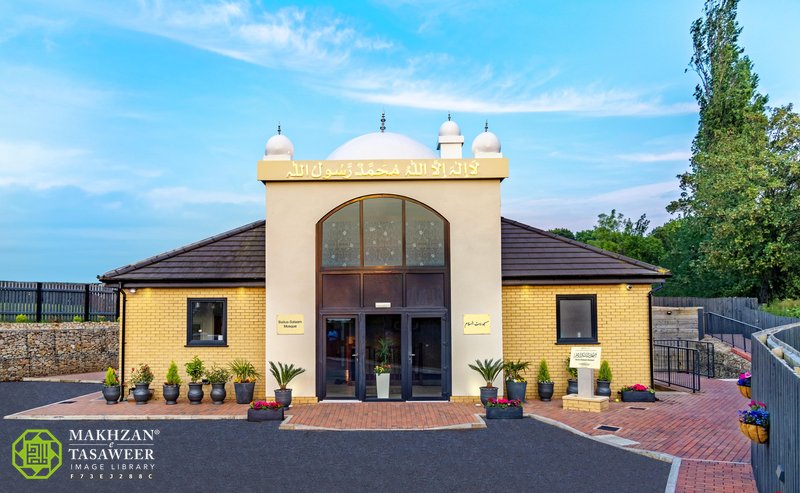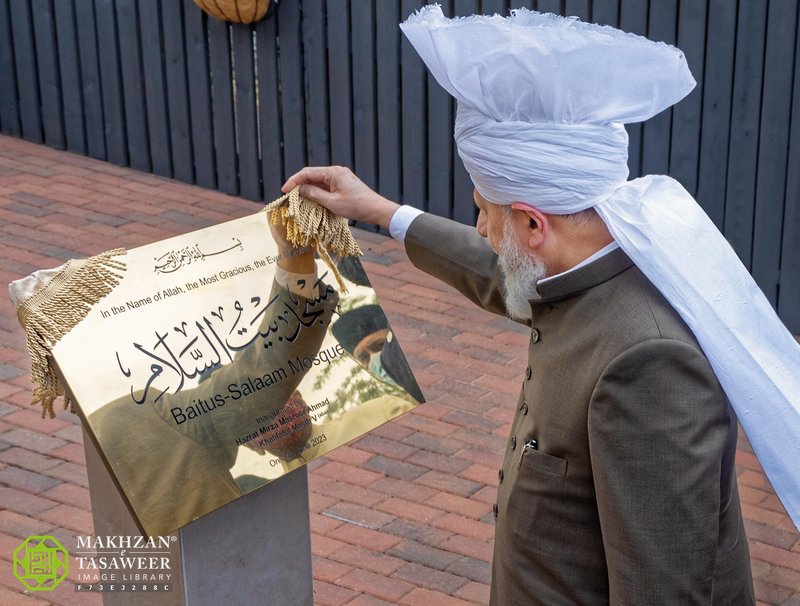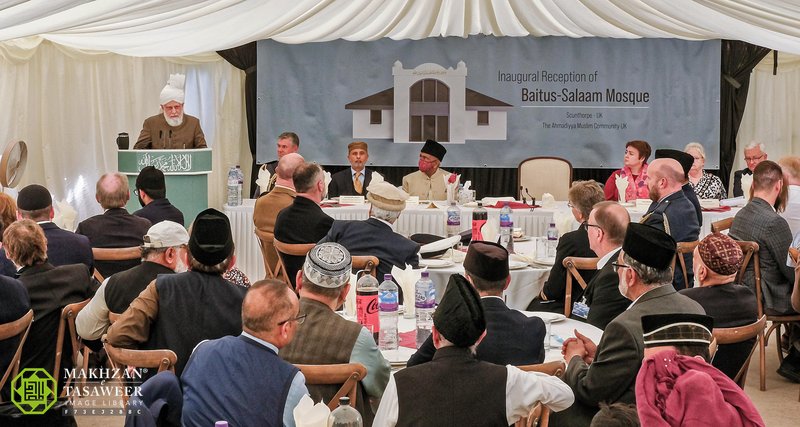
After reciting Tashahhud, Ta’awwuz and Bismillah, Hazrat Mirza Masroor Ahmad(aba), Worldwide Head of the Ahmadiyya Muslim Community said:
‘All distinguished guests,
Assalamo Alaikum Wa Rahmatullahe Wa Barakatohu – may peace and blessings of Allah be upon you all.
First of all, I wish to sincerely thank all of our guests who have joined us for the inauguration of our new mosque here in Scunthorpe.
Most of our guests are neither directly affiliated with our community nor indeed with Islam, and so it is a testament to your generosity of heart and kindness that you have accepted our invitation to today’s event.
Offering my appreciation to you is actually a religious duty because the Holy Founder of Islam, the Holy Prophet Muhammad(sa), stated that a person who is not thankful to his fellow human beings cannot be grateful to God Almighty.
So, from a religious perspective, I am duty-bound to offer my heartfelt appreciation to all of you.
Unquestionably, we are delighted to finally be able to inaugurate this mosque, especially given that certain hurdles arose during the course of this project, which caused delays and concern.
For example, there was some local opposition to this mosque being built, but with the Grace of Allah, ultimately, all issues were resolved and we were granted permission to go ahead.
For this, I must express my gratitude to the council and relevant authorities and, indeed, to all members of the community who supported us in any way.
Certainly, for a religious person, a place of worship has immense value and significance.
Indeed, you may not realise just how much it means to us, as religious people who believe in God Almighty, to see how, with His mercy and help, all challenges and obstacles were overcome, and now our new mosque is complete and ready for use.
Again, I reiterate that where we are most grateful to God Almighty for His favours, we are also very appreciative of all those people who assisted us in the construction of this mosque and were supportive of it.
In this regard, many members of the local community, including both our members and others, deserve our thanks and prayers.
In terms of our members, this mosque was funded purely by the voluntary contributions of Ahmadi Muslims in order to raise this House of Allah.
They made very significant financial sacrifices with the pure intention of building a mosque where they could join together in one place to fulfil the rights of worship of Allah the Almighty and of His Creation.
It was their profound desire to have a place of worship that would be a means of creating a suitable environment to uphold and practice Islam’s ideals and values.

Perhaps, some of you will be alarmed to hear me say that this mosque will be a means of practising Islamic teachings or, by my assertion, that the mosque will be a means for our members to uphold Islam’s values.
Such fears are understandable, given the climate in which we live, where there is a tendency to view Muslims with a degree of suspicion or even as extremists based on the portrayal of Islam in the media and the conduct of a few extremist individuals and groups in recent times.
As a result, some of you may even fear that the opening of this mosque will lead to a new chapter in the history of extremism being written in your local community.
In this regard, rest assured that nothing could be further from the truth.
Islam’s teachings are diametrically opposed to all forms of extremism or terrorism.
Islam rejects all forms of violence and teaches peace and harmony and desires for people of all beliefs and religions to live amicably together with a spirit of mutual tolerance and compassion.
It calls for members of society to unite as human beings, irrespective of their differences, in a common cause of establishing peace and security for all mankind.
In terms of the objectives of mosques, on one occasion, the Founder of the Ahmadiyya Muslim Community(as) stated that if a person wishes to raise awareness of Islam in any town or place, they should build a mosque in that area.
By this, he meant that if a mosque is built, non-Muslims will naturally come to observe Islam’s teachings and see how it promotes a spirit of love, peace and brotherhood amongst all people.
They will see with their own eyes that where Muslims are duty-bound to fulfil the rights of Allah the Almighty, the teachings of Islam also require them to fulfil the rights of humanity and to seek the very best for all people, irrespective of their faith or beliefs.
We, Ahmadi Muslims, advocate and subscribe to these true and peaceful teachings of Islam and reject unequivocally those who seek to malign and distort Islam’s noble teachings through their hateful rhetoric and extremist acts.
As I have said, in this era, some people consider Islam as a religion of extremism and become nervous or fearful just hearing the words ‘Islam’ or ‘mosque’.
Such fears exist because they do not understand what Islam is and what the true objectives of a mosque are.
They are only aware of the horrific examples of so-called Muslim groups who, due to their political and vested interests, have presented Islam in such a heinous and poisonous way that it has caused immeasurable damage to the name of Islam and led directly to an utterly false portrayal of its teachings to take root in the non-Muslim world.
Therefore, I wish to make it crystal clear that the image created of Islam by extremists is entirely at odds with its actual teachings.
As I have said, Islam’s teachings are of peace, security and love.
These are not just my personal views or empty words designed to please or impress you; rather, these are the teachings of Islam’s Holy Book, which we believe to be the final law-bearing book and the direct Word of God received through revelation by the Holy Prophet Muhammad(sa).
I am speaking, of course, about the Holy Qur’an, which, for all Muslims, serves as the basis of our beliefs and how we live our lives.
The Holy Qur’an makes it categorically clear that there is no room for extremism or compulsion in religious matters and that every person is free to live their life according to their beliefs and customs.
Furthermore, wherever Muslims build Mosques, they are built to emulate and spiritually mirror the true objectives of the first House of God, the Holy Ka’bah in Makkah, which is the most sacred and holy place in Islam.
Indeed, it is in the direction of the Holy Ka’bah that every Muslim turns towards whilst offering their prayers.
Regarding the Ka’bah, chapter 3, verse 98 of the Holy Qur’an states that whosoever enters the Sacred House of Allah ‘enters peace’ – meaning that a true Muslim, upon entering a mosque, shall himself enter a state of peace, and shall be a guarantor of peace and security for others.
There are many other Qur’anic statements that further testify to the peaceful teachings of Islam.
For example, chapter 25, verse 64 of the Holy Qur’an, states:
“And the true servants of the Gracious God are those who walk on the earth humbly and when the ignorant address them, they avoid them gracefully by saying, ‘Peace’!”
In this verse, Muslims are commanded to remain humble and patient when subject to harassment and to avoid conflicts or disputes.
Muslims are taught that no effort should be spared in upholding the peace of society – to the extent that the Qur’an instructs Muslims to walk away in the face of intense provocation and offer ‘Salaam’ – that is, greetings of ‘peace’ – to ignorant and abusive people who speak harshly or seek confrontation.
Essentially, Islam commands Muslims to show the utmost restraint at all times and teaches that true strength of character lies not in responding to hateful attacks or offensive rhetoric in a like fashion but rather by demonstrating patience and upholding the peace of society.
Nonetheless, some people may query that if Islam’s teachings are so peaceful, then why does early Islamic history include incidents of warfare, and why were Muslims involved in battles?
In reality, these questions indicate an ignorance of early Islamic history.
No doubt, such views have been shaped by the opponents of Islam, who have presented only part of the story and failed to explain the proper context of the wars in early Islam.

The reality is that Islam only permits warfare under the most extreme circumstances.
Such permission was granted to the early Muslims only for the sake of establishing peace, upholding human rights and ensuring freedom of belief and conscience prevailed in society.
There is not enough time to go into detail, but suffice to say that after Islam was founded, the Holy Prophet Muhammad(sa) and his followers were subjected to horrific cruelties and sustained oppression.
They were tortured for their beliefs, and many Muslims were savagely murdered.
After thirteen years of relentless persecution, the chilling details of which send shivers down one’s spine, the Muslims left their homes and migrated from Makkah to Medina.
Yet still, the disbelievers of Makkah did not permit them to live in peace.
Instead, they belligerently pursued and waged war against the Muslims in order to eliminate Islam once and for all.
It was only then, under those extreme circumstances, that Allah the Almighty permitted the Muslims to engage in a purely defensive war.
This permission is enshrined in chapter 22, verses 40-41 of the Holy Qur’an, which states:
“Permission to fight is given to those against whom war is made, because they have been wronged — and Allah indeed has power to help them.
“Those who have been driven out from their homes unjustly only because they said, ‘Our Lord is Allah’ — And if Allah did not repel some men by means of others, there would surely have been pulled down cloisters and churches and synagogues and mosques, wherein the name of Allah is oft commemorated.”
In these verses, Allah the Almighty declares that permission to fight was granted to the early Muslims because they were being mercilessly attacked by people who not only sought to destroy Islam but had an even broader agenda – to destroy the institution of religion itself.
Indeed, it was their resolute objective and firm intention to bring an end to all forms of religious freedom.
Thus, permission for a defensive war was not granted solely to protect Muslims or the religion of Islam.
Instead, the Muslims are commanded by Allah the Almighty to protect the places of worship of all faiths, be they temples, churches, synagogues or otherwise.
Whilst elements of the media and the opponents of Islam have long sought to unfairly distort the teachings of Islam, there are some notable exceptions.
For example, in ‘People of the Book: Prophet Muhammad’s Encounters with Christians, the American academic Dr Craig Considine, who has researched early Islamic history very diligently, states:
“Muhammad and the believers of the early ummah (Muslim community) created a nation founded upon ally-ship, civility, cross-cultural interactions, freedom of conscience, freedom of religion, freedom of speech, interreligious dialogue, mutual dependency, and religious pluralism.”
Accordingly, these are the immaculate standards of religious freedom according to Islam – that all people should have the right to worship according to their religious beliefs and be free to congregate in their places of worship.
In essence, Islamic teachings are that Muslims are duty-bound to not only fulfil the rights of their Creator but also to fulfil the rights of mankind, and these are the twin principles upon which Ahmadi Muslims base their lives.
Moving forward to today, religious wars are no longer taking place.
Rather, the conflicts we observe today are geopolitical in nature.
If Muslims or Muslim nations are taking any part, it is to fulfil their political ambitions and vested interests and not motivated by their religion.
Thus, in today’s society, it is not a question of Muslims against non-Muslims and nor are wars being fought to eliminate religion.
In addition, it is wrong to suggest that conflict is limited to Muslim countries.
The non-Muslim world is also engaged in warfare, as we see most prominently in Ukraine.
Hence, as I have said, the wars taking place today are for territorial or political objectives, and it would be wholly unfair to link them to any religion or religious beliefs.
In terms of Muslims living here in the Western world, where religious freedom exists, it is their duty to remain law-abiding and to strive to contribute to the progress and prosperity of the nation.
Certainly, as citizens of this country, we consider it our religious duty to be loyal citizens and to be grateful that we are able to live with religious freedom and that our human rights are protected.
In return, it is incumbent upon us to serve society and practically manifest Islam’s message of peace, love and tolerance.
This is why, alongside building mosques and seeking to convey Islam’s teachings, the Ahmadiyya Muslim Community places great emphasis on serving humanity.
For example, we have built schools and hospitals in some of the most economically deprived and impoverished countries that provide education and healthcare to the local people.
Further, our community is providing access to clean water to destitute people living in remote and underprivileged parts of the world by installing water wells and pumps in their local communities.

Living here in the West, it is impossible to fathom the dire situation in those under-developed nations where it is common for people to walk for miles every day to fill buckets of water for their daily use.
Even that pond water they collect is often contaminated and unsafe.
When our volunteers travel to those distant and challenging lands and install water pumps or wells in their communities, the happiness and elation of the local people is beyond all measure.
It is inconceivable for people living in the developed world to understand the sense of unbridled joy they feel.
Having clean water flow from a tap at their doorstep is a genuinely life-changing experience for such people.
Only if you have seen it with your own eyes can you begin to understand their joyful emotions.
I should also clarify that all our humanitarian services are offered irrespective of religious beliefs.
In fact, most people that benefit from our schools, hospitals or other humanitarian projects do not adhere to any religion.
Our efforts are underpinned and inspired by the teachings of Islam and are rendered purely for the sake and betterment of humanity.
We consider the burdens of the weakest members of society as our own and that it is our duty to provide help and comfort to all those who are in need or vulnerable.
In short, Islam’s teachings oblige us to live peacefully and to co-exist with other people.
It requires us to serve our communities, strive to enrich them and contribute to their development.
Now this mosque has been opened, I am sure the local people in Scunthorpe and the surrounding areas will see for themselves these true Islamic values in practice.
Consequently, I believe that if anyone still harbours any reservations or fears about this mosque, they will soon vanish.
This mosque has been named the ‘Baitus Salaam Mosque’, which literally means the ‘House of Peace’.
And, in accordance with this name, I am confident that the local Ahmadi Muslims will be those who foster peace and love in society, observe the laws of the land and excel in serving their community and the wider society. God Willing, they will forever reflect the true teachings of Islam.
At the end, I pray that this mosque proves to be a shining beacon of peace and a means of elevating and strengthening the fabric of societal cohesion.
May Allah the Almighty enable the local Ahmadi Muslims to live up to their religious teachings, and may we all, for the betterment of our nation and the world at large, live together in peace and harmony.
With these words, I wish to reiterate my heartfelt gratitude to all of you for joining us this evening.
May Allah the Almighty bless you all, Ameen.
Thank you very much.’